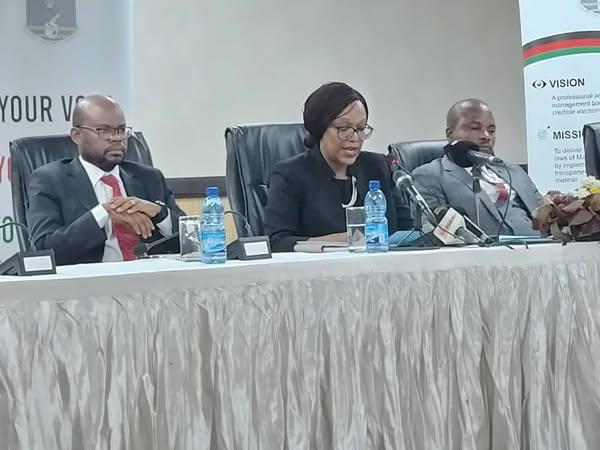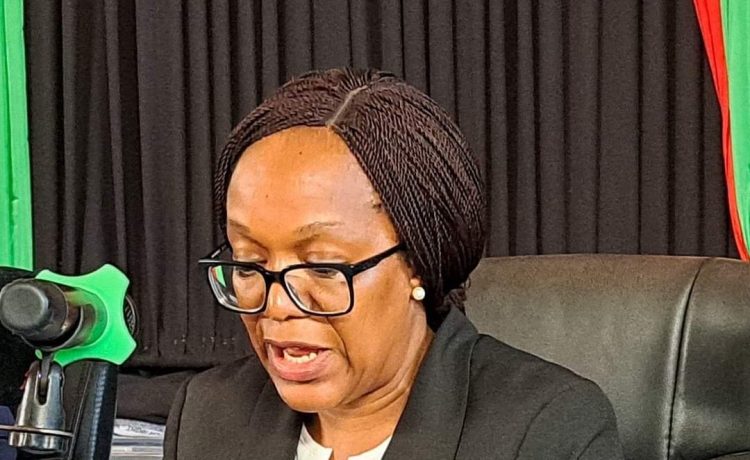
The Chairperson of the Malawi Electoral Commission (MEC), Justice Annabel Mtalimanja, revealed plans for a supplementary voter registration drive, set to occur from January 21 to February 3, 2025. This initiative will offer another chance for eligible citizens to register in preparation for the General Election scheduled for September 16, 2025.
During a press conference, Justice Mtalimanja explained that the necessity for this supplementary registration stems from issues noted during the initial voter registration period, which started on October 21, 2024. She highlighted that many eligible voters could not register due to complications with receiving national identity cards from the National Registration Bureau (NRB), which left them without necessary proof of eligibility.
“Today we take decisive action to ensure that all eligible Malawians can cast their votes,” stated Justice Mtalimanja during a press conference held yesterday, reinforcing MEC’s commitment to an inclusive electoral process. She referred to a High Court ruling that mandated the NRB to facilitate voter registration for those who met the eligibility requirements yet lacked the necessary documents.
This move represents a critical effort to enhance electoral participation and uphold the democratic rights of all Malawians.
A Commitment to Inclusivity
Justice Annabel Mtalimanja, Chairperson of the MEC, recently addressed the media to explain the significance of the supplementary voter registration scheduled from January 21 to February 3, 2025. “Today we take decisive action to ensure that all eligible Malawians can cast their votes,” she affirmed, emphasizing the Commission’s commitment to inclusivity and equity in the electoral process.
The supplementary registration is a direct response to challenges encountered during the initial voter registration period that commenced on October 21, 2024. Many eligible voters faced barriers such as delays in obtaining their national identity cards from the National Registration Bureau (NRB), leaving them unable to register as voters. Recognizing this issue, the MEC is stepping forward to address these gaps and ensure that the voices of all citizenry are heard.
Compliance of Court’s Order
The importance of this initiative is further underscored by a High Court ruling from October 25, 2024, which instructed the NRB to establish effective mechanisms for assisting qualified individuals who were unable to register due to administrative challenges. The court’s decision exemplifies the legal framework guiding the electoral process, ensuring that eligibility criteria as outlined in the Malawian Constitution, specifically Section 77, are met.
Justice Mtalimanja’s announcement brought forth the promise that those who registered with the NRB from October to January, but did not receive their unique identification numbers in time for the original voter registration phases, will now have the opportunity to register as voters. This targeted approach reflects a nuanced understanding of the challenges faced by various segments of the population.
The Phased Registration Plan
The supplementary registration process will be carried out over three phases, encompassing a total of 1,974 registration centers across the country—representing approximately 31% of all available centers. The phased approach aims to strategically support those who need assistance while ensuring the process is manageable and efficient.
Phase 1: Will take place on January 21 and 22 in councils like Lilongwe, Mangochi, M’mbelwa (Mzimba) Chikwawa, Nsanje and Mwanza.
Phase 2: Scheduled for January 27 and 28, will cover other regions including Nkhata Bay; Rumphi; Likoma; Kasungu; Kasungu Municipality; Dowa; Mchinji; Ntcheu; Zomba; Zomba City; Blantyre; Blantyre City; Thyolo; and Luchenza.
Phase 3: Will conclude the initiative on February 2 and 3 in councils such as Chitipa; Karonga; Karonga Town; Mzuzu City; Nkhotakota; Ntchisi; Salima; Dedza; Balaka; Machinga; Chiradzulu; Neno; Phalombe; and Mulanje.
The MEC has curated the registration schedule to be accessible, with operations running from 8:00 AM to 4:00 PM at each center. Justice Mtalimanja highlighted the staff and equipment will be sufficiently prepared to register everyone who presents themselves during the allotted time.
The Role of Stakeholders
To bolster the integrity and transparency of the voter registration exercise, the Commission is keen to involve stakeholders, including political parties and civil society organizations (CSOs). The participation of these groups is essential, as they will observe the process, ensuring adherence to established laws and practices.
“Political parties and CSO observers will play a critical role in enhancing the credibility of the registration process,” Justice Mtalimanja urged, inviting representatives to monitor the proceedings and report any discrepancies. This collaborative approach fosters trust and accountability within the electoral framework.
The supplementary voter registration comes at a crucial juncture in Malawi’s political landscape. With a population projected at around 10.9 million eligible voters, every registered voice is vital in guiding the decisions that will shape the nation’s future.
The MEC will conduct the supplementary registration across 1,974 selected voter registration centers, focusing on 271,784 individuals who registered with NRB between October and January. The process will unfold in three phases, spread across various councils in Malawi.
Justice Mtalimanja also stressed the importance of monitoring the registration process by political parties and civil society organizations to uphold integrity and transparency. She invited representatives from these groups to observe the registration efforts, which would further ensure public confidence in the electoral process.
Eligible citizens are encouraged to present themselves promptly at the registration facilities, emphasizing that those already registered should not attempt to register again. The productive engagement of voters is vital this election season, as it embodies the spirit of democratic leadership and participation.
As the country gears up for this critical electoral moment, the supplementary voter registration promises to pave the way for greater voter inclusivity and a robust democratic process.













